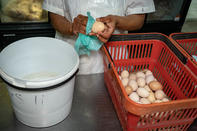To prevent deterioration, eggs should be moved to consumers as quickly as possible. The eggs should also be kept at temperatures below 13 degrees Celsius and never be left in the sun or in a room that gets very hot.

The Food and Agriculture Organisation (FAO) of the United States suggests the following steps to prevent the deterioration of eggs:
- Move the eggs to shaded, well-ventilated rooms and underground cellars as quickly as possible after it has been laid.
- Refrigerated storerooms or electric fans can be used if electricity is available.
- Where no electricity is available, the eggs can be placed in the shade or a dark room and covered with green leaves to further reduce temperatures.
- The eggs may be kept in a wide-mouthed earthen pot that is buried in the ground up to half its height. The inside of the pot should be lined with grass to prevent the eggs from absorbing excess moisture and a thin cloth should be placed on top of the eggs to allow air movement. A layer of sand and earth is spread around the pot and water should be sprinkled on it frequently during the day to keep it cool. The eggs should be turned once a day.
- Under dry climatic conditions the eggs may be stored in baskets inside a wooden or wire frame cupboard. A water tray is kept on top of the box, with pieces of sacking placed in the tray and arranged so the wet sacks hang over the sides of the box.
Dirty Eggs

Washing is the most effective and simplest ways of removing dirt and stains from shells, but water may contain bacteria that can penetrate the egg shells.
Cleaning should therefore preferably be done with an odourless detergent sanitising substance or with hot water of around 38 degrees Celsius, according to the FAO.
The drawback here is the detergents may be expensive or unavailable and that hot water may cause egg shells to crack. Another alternative is to use dry abrasives for scraping and brushing the eggs clean. The FAO suggests that this should be done carefully to avoid damage to the egg shells.
Shell Oiling
Eggs can be coated with a thin film of special, odourless, low viscosity mineral oils to reduce evaporation losses, especially where eggs are in cold storage for several months or are held at temperatures above 21° C, according to the FAO.
Where eggs must withstand high temperatures, the FAO suggest they are oiled from four to six hours after lay; and 18 to 24 hours after lay if they will be stored at a temperature of 0° C.
By Glenneis Kriel